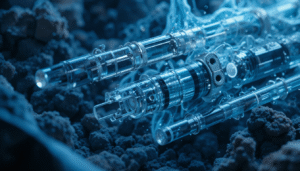
Industrial sectors in Dubai rely heavily on accurate gas detection for safety and compliance. From oil and gas plants to laboratories and manufacturing facilities, identifying hazardous gases is a crucial part of maintaining a safe work environment. Gastec tubes, also known as gas detection tubes, play an important role in this process. These tubes provide a quick and efficient method for detecting and measuring specific gases in the air without the need for complex electronic devices.
This guide explains what Gastec tubes are, how they work, where they are used, and why they are vital for industries across Dubai.
What Are Gastec Tubes?
Gastec tubes are glass tubes filled with a chemical reagent that reacts with specific gases or vapors. When air is drawn through the tube using a hand pump, the reagent changes color, indicating the presence and concentration of a particular gas.
Each tube is designed to detect a specific gas such as carbon monoxide, hydrogen sulfide, ammonia, or chlorine. The color change provides a visual measurement, allowing users to read the gas concentration directly from the scale printed on the tube.
These tubes are widely used in Dubai’s industries because they are simple, portable, and do not require electricity or calibration. They are suitable for both indoor and outdoor testing environments.
How Do Gastec Tubes Work?
The working principle of Gastec tubes is based on a simple chemical reaction. The process usually involves three steps:
- Sampling:
Air from the environment is drawn through the Gastec tube using a manual sampling pump. - Reaction:
The gas interacts with the chemical reagent inside the tube. This reaction causes a visible color change along the length of the tube. - Measurement:
The length of the color change corresponds to the concentration of the gas, which can be read directly from the printed scale on the tube.
This simple method offers accurate results within minutes, making it ideal for field use. The accuracy of the measurement depends on the correct tube selection and proper sampling technique.
Applications of Gastec Tubes in Dubai
Dubai’s industrial and commercial sectors depend on reliable gas detection to ensure safety and meet regulatory standards. Gastec tubes find applications across various industries, including:
1. Oil and Gas Industry
Gas leaks can pose serious safety risks in refineries and offshore platforms. Gastec tubes are used to detect hydrocarbons, hydrogen sulfide, and other toxic gases to prevent accidents and ensure worker safety.
2. Environmental Monitoring
In Dubai, environmental agencies and laboratories use Gastec tubes for air quality testing. These tubes help monitor pollutants, volatile organic compounds (VOCs), and greenhouse gases in industrial and urban areas.
3. Manufacturing Facilities
Factories often use gases in their production processes. Gastec tubes help detect leaks of chemicals like ammonia or chlorine, ensuring compliance with workplace safety standards.
4. Laboratories and Research Centers
Scientific laboratories in Dubai rely on Gastec tubes for quick and accurate gas identification during experiments or maintenance checks.
5. Construction and Confined Spaces
Workers in confined spaces, such as tunnels or storage tanks, use Gastec tubes to check for oxygen deficiency or toxic gas buildup before entering.
Advantages of Using Gastec Tubes
Gastec tubes offer several practical benefits, making them a preferred choice for on-site gas detection.
1. Easy to Use
The system is simple and does not require advanced training. A user can obtain results in just a few minutes.
2. Portable and Compact
The tubes and hand pump are lightweight and easy to carry, ideal for field inspections and remote areas.
3. Accurate and Reliable
Each tube is calibrated for specific gases, ensuring consistent and reliable results when used correctly.
4. Cost-Effective
Compared to electronic gas detectors, Gastec tubes are affordable and require no maintenance or power supply.
5. Wide Detection Range
There are tubes available for hundreds of gases, making the system versatile for multiple industries.
Safety and Maintenance Guidelines
Although Gastec tubes are simple to use, proper handling ensures accuracy and safety.
- Always select the correct tube for the target gas.
- Check the tube’s expiration date before use.
- Avoid exposure to extreme temperatures or direct sunlight.
- Dispose of used tubes according to local environmental regulations.
- Use the hand pump correctly and ensure it is clean and leak-free.
By following these steps, users can maintain precision and safety during gas testing operations.
Environmental Impact and Sustainability
Dubai emphasizes sustainability and environmental protection. Gastec tubes contribute to these goals by helping industries monitor and control emissions. Detecting leaks early prevents air pollution and minimizes environmental damage.
Additionally, since Gastec tubes do not rely on batteries or electrical power, they generate minimal waste and have a smaller environmental footprint compared to electronic devices.
Why Gastec Tubes Are Essential in Dubai’s Industrial Sector
The industrial and construction growth in Dubai increases the demand for effective safety tools. Gastec tubes offer a dependable method for detecting hazardous gases quickly, ensuring worker safety, and complying with international safety regulations.
Whether used in a refinery, factory, or environmental lab, these tubes help maintain safe operations and prevent costly incidents. Their affordability, accuracy, and portability make them a practical solution for many organizations across the region.
Conclusion
Gastec tubes are a reliable, easy-to-use solution for detecting gases in various environments. Their role in ensuring workplace safety and environmental monitoring is crucial for Dubai’s industrial landscape. As industries continue to grow, the importance of accurate gas detection will only increase.
By using Gastec tubes, businesses in Dubai can maintain a safer working environment, ensure regulatory compliance, and contribute to sustainability goals through responsible monitoring and prevention practices.